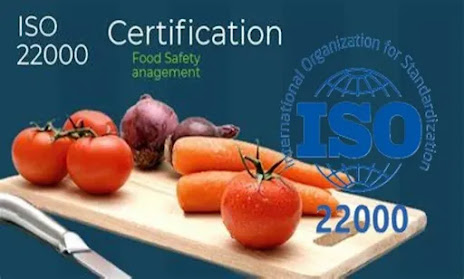Importance of ISO 22000 – Food Safety Management System Certification.
ISO 22000 is an internationally recognized standard that specifies the requirements for food safety management systems.
Introduced in 2005, ISO 22000 certification is suitable for all organizations involved in the food chain whose primary purpose is to ensure food safety. This standard provides a framework for coordinating all parts of the food chain from farms to forks. This can reduce food-related risks, manage hazards and prevent pollution.
The ISO 22000 standard aims to reduce the risk of bacterial contamination and thus the risk of disease throughout the food chain.
ISO 22000 certification provides the organization with the relevant FSMS framework. Organizations can purchase a variety of ISO 22000 packages based on their unique needs.
ISO 22000 certified companies can tell their customers that they have a food safety management system. International standards are constantly being revised to maintain relevance to the modern food safety industry.
The ISO 22000 standard gives customers confidence that their products are safe. This is very important for both businesses and consumers.
Why is it important?
Food safety management is the subject of many articles around the world, and if a company chooses to avoid it, the consequences must be faced. Obtain ISO 22000 certification to demonstrate commitment and compliance.
ISO 22000 is an international standard that serves as the organizational standard for food chains. ISO 22000 includes both traditional quality insurance and precautionary measures.
The main purpose of ISO 22000 is to provide a practical approach to making decisions to reduce and eliminate food safety risks to protect consumers. ISO 22000 aims to support the organization.
Integrate and improve the internal processes needed to consistently deliver safe food. It provides organizations and management with the assurance that their procedures and practices are in place and are highly effective and reliable.
We are confident in our organization's ability to manage food safety risks and deliver safe products and provide them to our customers and other stakeholders.
Ensure a sense of continuous improvement that requires evaluation and updating of the food safety management system so that all food safety activities are continuously optimized and more effective. Ensuring proper management at all stages of the food chain to avoid food safety hazards.
Food safety is important to consumers and food companies. Due to the risk of food poisoning in consumers.
Food safety management systems provide an effective framework for managing the responsibilities and roles of companies related to food safety and its customers. ISO 22000: 2018 compliant food safety management system requirements
ISO 22000 contains a set of requirements for a food safety management system. All organizations in the food chain must demonstrate their ability to manage food safety risks to ensure that food is safe for human consumption.
ISO 22000 applies to food chain organizations and businesses that want to implement a food safety management system to provide consumers with safe products. It depends on the country and food.
Benefits of adopting ISO 22000: 2018
-It shows the company's commitment to food safety and the improvement of its corporate image from the perspective of customers and regulatory agencies.
-Improve internal and external and daily communication with suppliers, customers, and other stakeholders regarding food safety. -
Reduce the possibility of product recalls as a preventative system to reduce potential food risks.
-Develop a systematic approach to identify food safety hazards and develop and implement preventative measures.
-Supports companies that comply with national standards and specifications.
-Adhere to the principles of the norm.
-Help food companies export their products abroad.
-This allows companies to enter into government contracts and supply food parts to large companies.
-Allows companies to align their food safety management systems with other recognized quality management systems such as quality control systems (ISO 9001) and environmental control systems (ISO 14001).
Benefits of achieving ISO 22000: 2018
- Improved food production process
- Achieve customer and regulatory satisfaction
- Ensure the competitive advantage of the organization
- Increase sales/income
- Get better results than your competitors
Organizations interested in implementing ISO 22000: 2018
- Companies of all types of food chains, from feed and seed manufacturers to major food retailers, regardless of company or size.
- Food processors, food retailers, and food service providers.
- Restaurant, commercial kitchen, food service provider.
- Hospitals and hotels
Why do companies want ISO 22000: 2018 certification?
Improved food production practices: Statistics show that 92% of companies adopting ISO 22000 benefit from taking rigorous steps to improve food production practices, thereby being safe and healthy. We provide traditional foods and reduce food safety risks.
Achieving customer and regulatory satisfaction: Statistics show that 97% of organizations implementing ISO 22000 have successfully achieved customer and regulatory satisfaction.
Organizational Competitive Advantage: According to statistics, 73.3% of organizations implementing the ISO 22000 system have achieved a competitive advantage. This will get more orders.
Sales / Sales Increase: Statistics show that 32.5% of organizations adopting the ISO 22000 system were able to export and enter markets that were not possible before. That means they bring more orders
Easy and cheap: ISO 22000 certification is no longer expensive and doesn't require the long wait times previously required.
Competition will soon get ISO 22000 certification: If your competitor has not yet got ISO 22000 certification, many food companies have already got ISO 22000 certification or will get it soon, so get it now.
ISO 22000: 2018 clause
- Section 4 Organizational Context
- Paragraph 5 Guidance
- Section 6 plan
- Support for Clause 7
- Section 8 operations
- Performance evaluation of Clause 9
- Improvement of Clause 10




Post a Comment